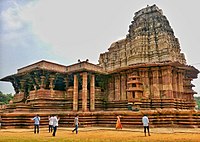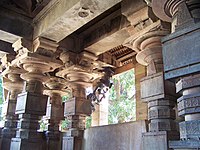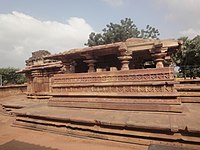Ramappa Temple
18°15′33″N 79°56′36″E / 18.25917°N 79.94333°E
| Ramappa Temple | |
|---|---|
 | |
| Religion | |
| Affiliation | Hinduism |
| District | Mulugu |
| Deity | Lord Siva Ramalingeswara Swamy[1] |
| Festivals | Maha Sivaratri |
| Location | |
| Location | Palampet village |
| State | Telangana |
| Country | India |
| Architecture | |
| Architect(s) | Ramappa, Bhumija style/Kadamba architecture/Vesara |
| Type | Kakatiya Dynasty, Bhumija |
| Creator | Recherla Rudra |
| Completed | 11th Century |
| Direction of façade | East-facing |
Ramappa Temple also known as the Ramalingeswara temple, is located 77 km from Warangal, the ancient capital of the Kakatiya dynasty, 15km from Mulugu, 209 km from Hyderabad in the state of Telangana in southern India. It lies in a valley at Palampet village of Venkatapur Mandal, in erstwhile Mulug Taluq of Mulugu district, a tiny village long past its days of glory in the 13th and 14th centuries.[2] An inscription in the temple dates it to the year 1213 CE and says it was built by a General Recherla Rudra, during the period of the Kakatiya ruler Ganapati Deva.[1]
The temple is a Shivalaya, where Lord Ramalingeswara is worshipped. Marco Polo, during his visit to the Kakatiya Empire, allegedly called the temple "the brightest star in the galaxy of temples".[3] Ramappa Temple stands majestically on a 6 ft high star-shaped platform. The hall in front of the sanctum has numerous carved pillars that have been positioned to create an effect that combines light and space wonderfully. The temple is named after the sculptor Ramappa, who built it, and is perhaps the only temple in India to be named after a craftsman who built it.[4]
The main structure is in a reddish sandstone, but the columns round the outside have large brackets of black basalt. These are carved as mythical animals or female dancers or musicians, and are "the masterpieces of Kakatiya art, notable for their delicate carving, sensuous postures and elongated bodies and heads".[5]
The Temple is included in the proposed UNESCO World Heritage Site "The Glorious Kakatiya Temples and Gateways", in 2019 on the "tentative list". The proposal was submitted to UNESCO on 10 September 2010.[6]
Description
The roof (garbhalayam) of the temple is built with bricks, which are so light that they are able to float on water.[7]
Some bricks of the Ramappa temple and Humayun's tomb were sent for examination to Dr. Habib Haman, Chief Chemist of Government Industrial Laboratory, Hyderabad, Dn. He has kindly reported as follows: 'The samples of floating bricks from Bidar are similar to those from Warangal as far as the method of manufacture is concerned. The material used to make the brick spongy was apparently saw-dust. The weight of the specimens is 1⁄3 to 1⁄4 of the ordinary bricks of the same size. The Bidar specimens show better quality as regards homogeneous mixing and uniform burning than their proto-types from Ramappa, as a result of which the porosity is well-maintained in the body of bricks from Bidar and they float well in water.'[8]
There are two small Shiva shrines on either side of the main temple. The enormous Nandi within, facing the shrine of Shiva, remains in good condition.
Nataraja Ramakrishna revived Perini Shivatandavam (Perini Dance), by seeing the sculptures in this temple. The dance poses, written in Nritta Rathnavalid by Jayapa Senaani, also appear in these sculptures.
The temple remained intact even after repeated wars, plunder and destruction during wars and natural disasters. There was a major earthquake during the 17th century which caused some damage.
Many of the smaller structures were neglected and are in ruins. The Archaeological Survey of India has taken charge of it. The main entrance gate in the outer wall of the temple is ruined.[9]
Location
Ramappa temple is located in Palampet, Venkatapur mandal which is 19 km from Mulugu Mandal (around 70 km off Warangal City).
It is 6 km away from Kota Gullu where another lord shiva temple is located. Tourists from Hyderabad can reach to Ramappa Temple via Hanamkonda.
Gallery
-
From the side
-
Front
-
From behind
-
One of the distinctive dancers
-
Dancer
-
Pillar inside the mandapa
-
Inside the mandapa
-
Smaller temple
References
- ^ a b Gollapudi Srinivasa Rao. "Ramappa temple never fails to surprise visitors". The Hindu. Retrieved 1 January 2015.
- ^ "The Shiva temples at Palampet". Retrieved 11 September 2006.
- ^ Dobbie, Aline (2006). India: The Elephant's Blessing. Melrose Press. p. 36. ISBN 978-1-905226-85-6.
- ^ UNESCO "The Glorious Kakatiya Temples and Gateways", Tentative List
- ^ Michell, 385
- ^ UNESCO "The Glorious Kakatiya Temples and Gateways", Tentative List
- ^ http://www.telanganatourism.gov.in/partials/destinations/divine-destinations/warangal/ramappa-temple.html
- ^ Bidar, Its History and Monuments, Yazdani, G., https://books.google.co.in/books?id=w6xpQpOCtzAC, 1947, Oxford University Press, p. 133
- ^ "Warangal Temples, Telangana". Retrieved 11 September 2006.
- Michell, George, The Penguin Guide to the Monuments of India, Volume 1: Buddhist, Jain, Hindu, 1989, Penguin Books, ISBN 0140081445















